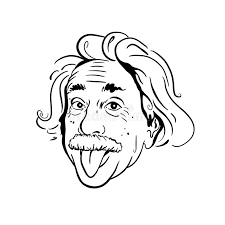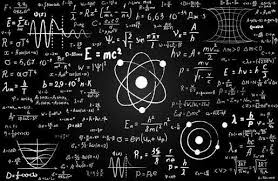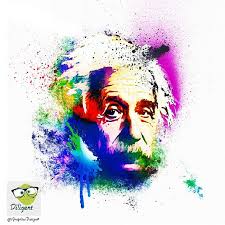Albert Einstein (1879-1955) was a German-born physicist who is widely recognized as one of the most important scientists of the 20th century. He is  perhaps best known for his groundbreaking theory of relativity, which fundamentally changed our understanding of space, time, and gravity.
perhaps best known for his groundbreaking theory of relativity, which fundamentally changed our understanding of space, time, and gravity.
Einstein was born in Ulm, in the Kingdom of Württemberg, in the German Empire. He attended school in Switzerland, and after graduating, he worked as a patent clerk in Bern. It was during this time that he began to develop his revolutionary theories about the nature of the universe.
In 1905, Einstein published a series of papers that laid the groundwork for modern physics. In these papers, he introduced the concept of special relativity, which states that the laws of physics are the same for all observers in uniform motion relative to each other. He also proposed the famous equation E=mc², which showed that mass and energy are interchangeable.
In 1915, Einstein published his theory of general relativity, which extended the principles of special relativity to include gravity. This theory explained the motion of planets around the sun, and predicted that massive objects could bend the fabric of spacetime.
Einstein was awarded the Nobel Prize in Physics in 1921 for his work on theoretical physics. Later in life, he became a political activist and advocate for world peace. He emigrated to the United States in 1933 to escape persecution by the Nazi regime, and he eventually became a citizen. Einstein died in Princeton, New Jersey, in 1955, at the age of 76.
Albert Einstein was a theoretical physicist who is widely considered to be one of the most influential scientists of the 20th century. He was born on March 14, 1879, in Ulm, Germany, and died on April 18, 1955, in Princeton, New Jersey, United States.
Einstein is most famous for his theory of relativity, which fundamentally changed our understanding of space and time. His equation, E=mc², showed that mass and energy are interchangeable, and his work on the photoelectric effect helped establish the concept of quantization in physics. He also made significant contributions to the development of quantum mechanics and statistical mechanics.
Einstein was awarded the Nobel Prize in Physics in 1921 for his explanation of the photoelectric effect. He was also a prominent political activist, advocating for peace and civil rights, and was a supporter of Zionism.
Einstein’s work continues to influence modern physics and his name is synonymous with genius and innovation.
 Albert Einstein (1879-1955) was a German-born theoretical physicist who is widely considered to be one of the most influential scientists of the 20th century. He is best known for his theory of relativity, which fundamentally altered our understanding of space and time, and for his famous equation E=mc², which describes the relationship between mass and energy.
Albert Einstein (1879-1955) was a German-born theoretical physicist who is widely considered to be one of the most influential scientists of the 20th century. He is best known for his theory of relativity, which fundamentally altered our understanding of space and time, and for his famous equation E=mc², which describes the relationship between mass and energy.
Einstein was awarded the Nobel Prize in Physics in 1921 for his explanation of the photoelectric effect, which is the basis of modern electronics. He also made important contributions to the development of quantum mechanics, statistical mechanics, and cosmology.
In addition to his scientific work, Einstein was a passionate pacifist and activist, and he spoke out against war, nuclear weapons, and racism. He was a member of the NAACP and an advocate for civil rights. Einstein’s humanitarianism was also evident in his support for the establishment of the state of Israel.
Einstein’s work continues to influence modern physics, and his theories have been tested and confirmed in numerous experiments. He is widely regarded as one of the greatest scientists of all time, and his name has become synonymous with genius.
Albert Einstein was a German-born theoretical physicist who is widely regarded as one of the most influential scientists of the 20th century. He is best known for his groundbreaking work on the theory of relativity, which revolutionized our understanding of space, time, and gravity.
Born in 1879 in Ulm, Germany, Einstein showed an early interest in mathematics and physics. He worked as a patent clerk in Bern, Switzerland, while he developed his theories on relativity, publishing his first paper on the subject in 1905. This paper proposed that the laws of physics are the same for all non-accelerating observers, regardless of their relative motion.
Einstein continued to develop his theory of relativity, which culminated in the publication of his general theory of relativity in 1915. This theory proposed that gravity is not a force between objects, but instead arises from the curvature of spacetime caused by the presence of mass and energy.
Einstein’s work had a profound impact on our understanding of the universe, and he was awarded the Nobel Prize in Physics in 1921 for his  explanation of the photoelectric effect. He also made significant contributions to the development of quantum mechanics, statistical mechanics, and cosmology.
explanation of the photoelectric effect. He also made significant contributions to the development of quantum mechanics, statistical mechanics, and cosmology.
Einstein emigrated to the United States in 1933 to escape the rise of Nazism in Germany, and he became a citizen in 1940. He continued to work on physics throughout his life, but also became an outspoken advocate for pacifism, civil rights, and nuclear disarmament. He died in 1955 at the age of 76.
Albert Einstein (1879-1955) was a German-born theoretical physicist who is widely considered one of the most influential scientists of the 20th century. He is best known for his development of the theory of relativity, which fundamentally changed our understanding of space, time, and gravity.
Einstein was born in Ulm, in the Kingdom of Württemberg in the German Empire. He moved to Switzerland at the age of 16, where he studied physics and mathematics. In 1905, while working as a patent clerk, he published a series of groundbreaking papers on theoretical physics, including the theory of relativity and the famous equation E=mc², which describes the relationship between mass and energy.
Einstein’s work had a profound impact on the development of modern physics and led to many new discoveries in areas such as nuclear physics, cosmology, and quantum mechanics. He was awarded the Nobel Prize in Physics in 1921 for his work on theoretical physics, particularly his explanation of the photoelectric effect.
In addition to his scientific contributions, Einstein was also an outspoken pacifist and advocate for civil rights. He became a symbol of scientific genius and an icon of popular culture, with his distinctive hairstyle, quirky personality, and memorable quotes such as “Imagination is more important than knowledge.”
Albert Einstein (1879-1955) was a theoretical physicist who is widely regarded as one of the most influential scientists of the 20th century. He is best known for his groundbreaking theory of relativity, which revolutionized our understanding of space, time, and gravity.
Born in Ulm, Germany, Einstein showed an early aptitude for mathematics and physics. He studied at the Polytechnic in Zurich, Switzerland, where he received his diploma in 1900. After struggling to find work as a teacher or academic, Einstein took a job as a patent clerk in Bern, Switzerland, where he spent much of his time developing his own ideas in physics.
In 1905, Einstein published a series of papers that fundamentally transformed our understanding of the universe. Among these was his theory of special relativity, which showed that the laws of physics are the same for all observers moving at a constant speed relative to one another. He also proposed that matter and energy are interchangeable, as expressed in his famous equation, E=mc².
In 1915, Einstein published his theory of general relativity, which extended the principles of special relativity to include gravity. According to general relativity, massive objects like planets and stars cause a distortion in spacetime, which affects the motion of other objects around them.
Einstein’s work had profound implications for the development of modern physics, and he became a cultural icon, known for his distinctive appearance and eccentric personality. He was awarded the Nobel Prize in Physics in 1921 and emigrated to the United States in 1933 to escape Nazi persecution. He continued to work on his ideas in physics until his death in 1955.
Albert Einstein (14 March 1879 – 18 April 1955) was a German-born theoretical physicist who is widely considered to be one of the greatest scientists of all time. He is best known for his theory of relativity, which revolutionized our understanding of space and time.
Einstein was born in Ulm, in the Kingdom of Württemberg, Germany. He studied physics and mathematics at the Swiss Federal Polytechnic in Zurich, Switzerland, where he obtained his PhD in 1905. That same year, he published his groundbreaking papers on the photoelectric effect, Brownian motion, and special relativity, which established him as a leading figure in theoretical physics.
 In 1915, Einstein published his theory of general relativity, which extended his earlier work on special relativity and provided a new understanding of gravity as a geometric property of space and time. This theory predicted the bending of light by gravity, which was confirmed by observations during a solar eclipse in 1919, catapulting Einstein to international fame.
In 1915, Einstein published his theory of general relativity, which extended his earlier work on special relativity and provided a new understanding of gravity as a geometric property of space and time. This theory predicted the bending of light by gravity, which was confirmed by observations during a solar eclipse in 1919, catapulting Einstein to international fame.
Einstein continued to work in theoretical physics for the rest of his life, making important contributions to the development of quantum mechanics and statistical mechanics. He also became known for his political activism, particularly his opposition to the development of nuclear weapons and his support for the civil rights movement.
Einstein was awarded the Nobel Prize in Physics in 1921 for his work on theoretical physics, particularly his explanation of the photoelectric effect. He died in Princeton, New Jersey, United States in 1955 at the age of 76.
Albert Einstein (1879-1955) was a German-born theoretical physicist who is widely regarded as one of the most important scientists of the 20th century. He is known for his groundbreaking work in developing the theory of general relativity and the famous equation E=mc², which describes the equivalence of mass and energy.
Einstein was born in Ulm, Germany, and grew up in Munich. As a child, he showed a strong interest in science and mathematics. After completing his education in Switzerland, he worked as a patent clerk in Bern, where he began to develop his theories on relativity.
In 1905, Einstein published a series of papers that laid the foundation for modern physics. These papers included his theory of special relativity, which showed that the laws of physics are the same for all observers moving at constant velocity, and his famous equation E=mc², which demonstrated the equivalence of mass and energy.
In 1915, Einstein completed his theory of general relativity, which described the curvature of spacetime in the presence of mass and energy. This theory revolutionized our understanding of gravity and has been confirmed by numerous observations and experiments.
Einstein was also a pacifist and an advocate for nuclear disarmament. He immigrated to the United States in 1933 to escape Nazi persecution and worked at Princeton University until his death in 1955. He was awarded the Nobel Prize in Physics in 1921 for his work on theoretical physics.

